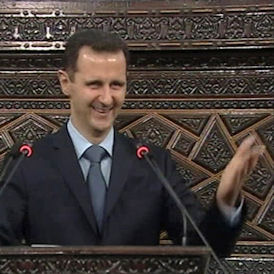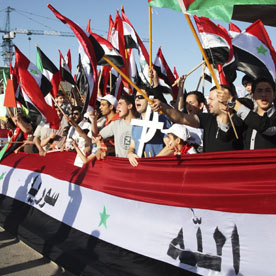Assad’s Syria vows retribution for ‘deadly attack’
Syrian troops with tanks are believed to be moving on the northwestern town of Jisr al-Shughur after the Assad regime vowed ‘firm retribution’ on ‘armed groups’ who they say killed 120 soldiers.

Local residents said a column of armoured vehicles and troops, apparently heading for Jisr al-Shughour, had reached the town of Ariha, 25 km (16 miles) to the east, a day after Information Minister Adnan Mahmoud said army units would carry out their “national duty to restore security”.
It comes after Syrian state television said armed groups had killed security personnel and civilians in multiple attacks in the northwestern town near the Turkish border.
In a televised statement, Mohammed Ibrahim al-Shaar, the Syrian interior minister, said: “The state will act firmly, with force and in line with the law. It will not stay arms folded in the face of armed attacks on the security of the homeland,”
“The armed groups are using weapons and grenades…the people in Jisr al-Shughur are urging the army to intervene speedily,” he continued.
The international media is banned from covering the uprising in Syria, making it virtually impossible to verify the state-controlled media’s claims.
Opposition groups have disputed the official report, saying the violence was between loyalist troops and army defectors.
Wissam Tarif, director of the human rights organisation INSAN, said the number of dead was “inconsistent.”
Warning: Our Foreign Correspondent Jonathan Miller's report below contains some upsetting images
‘Armed gangs’
State television reported that “armed gangs” ambushed police and 20 officers died. It said another 82 personnel were killed when the town’s security headquarters were overwhelmed and eight in a bomb attack on a post office, claiming that a total of 120 were killed overall.
“The security forces have managed to end a blockade of one of the neighbourhoods that was seized by the gunmen for a while and are now battling them to end the blockade of the other neighbourhoods,” according to the state television report on Monday.
“The gunmen mutilated some of the bodies and threw some into the river. The people in Jisr al-Shughur are urging the army to intervene speedily,” it said.
A number of users on social network sites Twitter and Facebook have disputed the official version of events. Some users say a group of soldiers who refused to fire on protesters battled with government troops.
Syria has been gripped by a popular uprising since March after four decades of rule by the Assad family.
The uprising began in the southern town of Deraa when a group of school children were arrested and reportedly tortured after spraying grafitti on public buildings.
Rights groups say that more than 1,000 people have died since the unrest began.

“Reform or step aside”
Foreign Secretary William Hague condemned the violence in Syria and said Britain had circulated a draft UN Resolution calling on President Assad to “reform or step aside.”
“Britain has circulated a draft UN Security Council Resolution condemning the repression in Syria and calling for the Syrian Government to meet their people’s legitimate demands, release all prisoners of conscience, lift restrictions on the media and Internet and co-operate with the UN High Commissioner for Human Rights,” he said.
But Hague added that more work would need to be done to persuade members of the Security Council not to veto the resolution.
French Foreign Minister, Alain Juppe, said that France was ready to ask the U.N. Security Council to vote on a draft resolution condemning Syria for its crackdown, despite the threat that Russia would veto the measure.
“The situation is very clear. In Syria, the process of reform is dead and we think that Bashar has lost his legitimacy to rule the country,” Juppe said in Washington on Monday.
“We’ll see what the Russians will do. If they veto, they will take their responsibility. Maybe if they see that there are 11 votes in favour of the resolution, they will change their mind. So there is a risk to take and we’re ready to take it.”
Amnesty International urged the Security Council to refer Syria to the International Criminal Court.
Memories of Hama massacre
Syrian forces crushed what the state said was an armed revolt by Sunni Islamists in the city of Hama in February 1982, on the orders of Bashar’s father President Hafez al-Assad, killing up to 40,000 people, the majority of whom were civilians.
It was carried out personally by President Bashar al-Assad’s younger brother Rifaat.
According to Syrian media at the time, anti-government rebels started the conflict by attacking government troops. The security forces then “rose to confront these crimes.”
In 1980 a rebellion in Jisr al-Shughur was also brutally crushed by Hafez al-Assad.
-
Latest news
-
Taylor Swift’s new break-up album breaks records3m

-
NHS trust fined £200K for failings that led to death of two mental health patients3m

-
Sunak vows to end UK ‘sick note culture’ with benefit reform3m

-
‘Loose talk about using nuclear weapons is irresponsible and unacceptable’, says head of UN’s nuclear watchdog3m

-
‘There wasn’t an Israeli attack on Iran,’ says former adviser to Iran’s nuclear negotiations team7m

-





